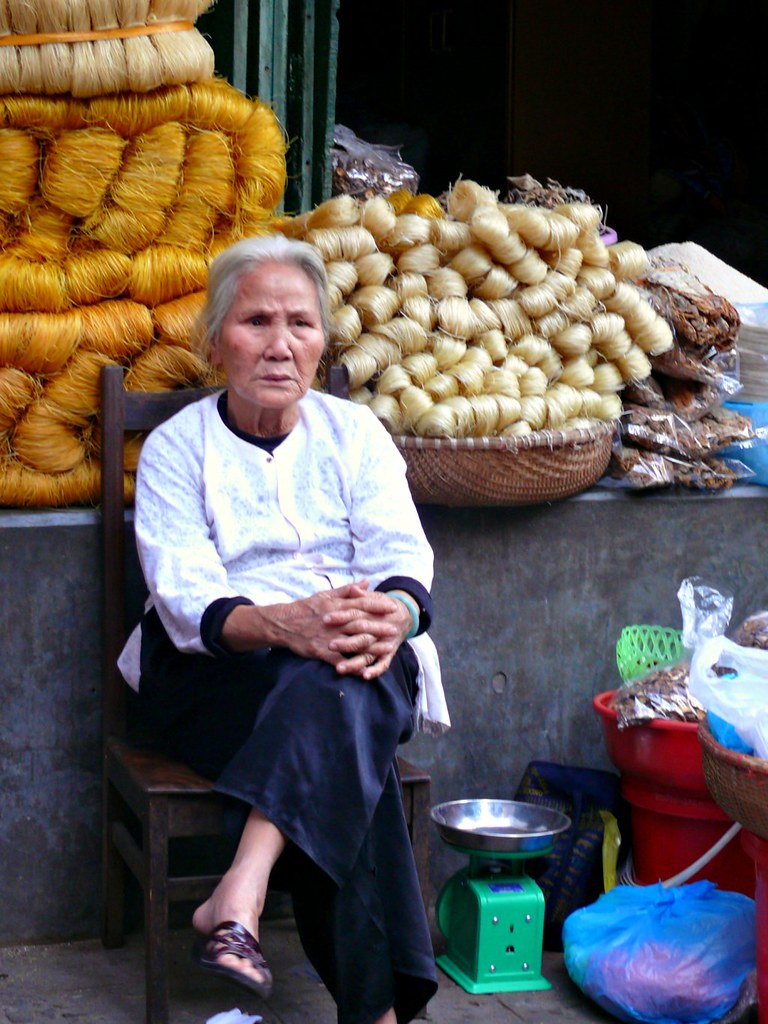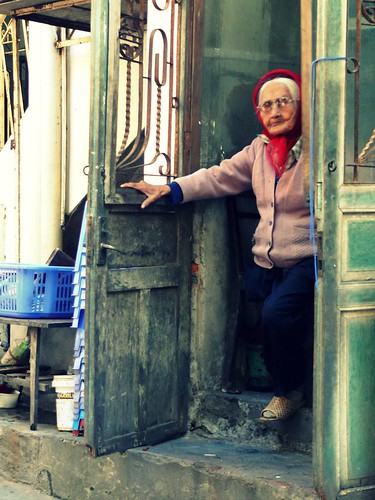"Another story exists about "stone soup", that in the United States of America, during the Great Depression, families were unable to put food on the table every day. It became a practice to place a large and porous rock in the bottom of the stock pot.
On days when there was food, the stone would absorb some of the flavor. On days when there was no food, the stone was boiled up, and the flavor would come out of the stone into the water, producing a weak soup, which was better than not eating.
This in theory is similar to China and Japan cooking using ceramic pots which adds flavour to the food after long term usage when the pot absorbed different flavours every time being used."
Wikipedia
It started with a comment on Twitter:
"Mr Sticki says I cook European/Asian/Fusion cooking is better than some restos,
but I'm sick of the taste of my own cooking. How did THAT happen?"
but I'm sick of the taste of my own cooking. How did THAT happen?"
It's true, I had begun to loathe the thought of eating my own food. It's embarrassing. It's shameful. Just to clarify, I wasn't sick of eating. I wasn't even sick of cooking. But I wanted my meal to be a surprise to the palate. The kind of good surprise you get when someone cooks a lovely meal for you.
I had become afflicted with the malaise of the spoilt. I harbored the ugly conceit of the wealthy - or of those who need not worry about where the next meal is coming from. I longed for something beyond what was available - forgetting that what I already had was exemplary. In the void of abject consumerism, I had developed a sickening greed, an avaricious obsession with the next great thing to eat. And I had forgotten the lessons of my youth.
Regrettably despairing of yet another home cooked meal for two, I set myself a challenge to cook a meal without tasting it during the cooking process. I would also avoid adding seasoning beyond what was in the garden. Worst case scenario, if it worked out crap I could fix it anyway. This is a game of the bored. I aimed to trick myself; to trick my palate.
As is the case often in our home, everything in that meal was either locally sourced produce, home-made or home grown. I would not be sourcing the finest European smallgoods made from pigs that had been hand fed Vietnamese lychees by nuns in a copse in Northern Spain and cured by a 104 year old Brazilian Bishop in a thousand year old smokehouse, built by gnomes.
There would be no truffles, nor expensive condiments. In short, there would be no gourmet exotica in the meal that would make online foodies rapturous. Despite of the lack of pretentiously labeled ingredients, I was blind to the fact that my kitchen contained a wealth of magnificent produce.
By my standards it was a simple meal: Hartdale Park venison fillets seared in a hot cast iron pan then rested for ten minutes, warmed through with beetroot and a reduction of juices made with a touch of sage, quince jelly and beetroot juice. Salad leaves and wild rocket were gathered from the garden along with more herbs. I tossed them with tomato and Meredith marinated chevre, a vinaigrette made with King Valley honey, mustard, oil and vinegar. Home grown potatoes were sliced, layered with thyme from the garden and baked in mornay of whole wheat flour, unpasteurised butter, Blue Bay Gruyere and raw milk.
I resisted the urge to taste anything while cooking. I was adamant that the flavours would be a surprise to me. No salt, pepper, dried spices or Asian condiments were used. Mr Sticki remarked at how fabulous the cheese sauce smelt. He had no doubts that this would taste good. And he was right. Call it a leap of faith on my behalf, but I won myself over.
The exercise came down to proving to myself that I had the technique nailed and that my olfactory senses were primed enough to judge without tasting. It also proved to me that while we expect great meals made from world renowned ingredients, it is also possible to make an exemplary tasting meal using a combination of the humble home sourced and the less fashionable, local produce, sourced farmer direct.
While I've always acknowledged this about meals in some of my favourite restaurants, I had a double standard for myself. I had presumed otherwise when it came to my home cooking. I shouldn't have, because it was one of the first lessons I learnt about cooking, watching my parents in the kitchen.
.
When I was a child, my parents shopped at wet markets overseas and at big fresh markets like the Queen Victoria Market in Melbourne. They rose early and we'd be there, armed with wheelie bags at 6:30am, listening to stall holders shouting out the day's specials. It was exciting and fascinating. Subconsciously I absorbed a great deal of knowledge about produce in that time. Sometimes - while living with other families - the food I ate came from supermarkets, and when I eventually left home, so did mine.
My passion for eating was cultivated from the time I began eating solids, I wasn't fed packaged baby foods. At the time we lived in Hong Kong and I spent a great deal of time in the care of my paternal grandmother and Loong Por, the elderly Chinese Nanny who continued to live with my Grandparents long after she had raised my father.
My Chinese granny introduced me flavor. At yum cha she would peel the skin from dumplings and tell me to taste the filling on its own. She did this so that I could appreciate the sheer simplicity of the ingredient's flavor, without the added complication of understanding the various textures of the whole. I suspect that she also felt the slimy rice skin on some dim sum as not sufficiently nutritious for infants.
In Hong Kong during the Second World War, my family suffered along with the rest of the territory, when food was in short supply and many survived on the famous 'stone soup'. This dish constituted a soup made with a handful of weeds or herbs and sometimes thickened with arrowroot. A stone was placed in the bowl so as to cheat the mind into thinking some solids had been taken, by licking the solution from the stone. It was also considered that the stone would absorb some of the flavor and would continue to add to the soup on a daily basis. Although my family fared a little better than some at the time, being raised under these circumstances influenced my father's attitude to food as an adult.
As a child I ate whatever Mum and dad ate. My mother never made me separate meals. We always sat at the dining table and ate together. They also took me out to dine with them in restaurants - in Hong Kong - where it was the norm for children to be present - and later, when we moved to London - where it was not the case. From sitting in a high chair, or sometimes upon their coats piled so that I could reach the table, I grew accustomed to the etiquette and privilege of dining out.
Food was a ritual, a celebration, an exploration. Food was something that was constantly asserted as a wonderful gift that I was lucky to be partaking of. When I lived with my foster families I was a peculiarity, I sat quietly at the dining table and immersed myself in the meal. Their children on the other hand, watched TV while eating or fought amongst themselves, some scowling at their food and needing to be bribed by dessert to empty their plate.
When I lived with my Hungarian foster family, the lesson of the privilege of having food on the table was re-iterated. Whilst the children were indulged and not indoctrinated, I observed the reverence to food that the holocaust survivors in our midst paid to every meal, every snack.
I learnt that my new 'aunts and uncles' had suffered the loss of their children, spouses, siblings and parents in concentration camps, and that their own bodies had wasted from severe lack of food. They had gone without for the longest time and scavenged whatever they could. The psychological and physical scars had impacted to the point that now, living in 'The Lucky Country', their bodies continued to struggle to cope once again with eating wholesome food.
In hindsight I truly regret forgetting this lesson.
I personally did not begin cooking in earnest until I was sixteen. I was immature and naive, and desperate to be free of the dysfunctional home. But I did have the capacity to realise that I had been spoilt when it came to matters of the table. I had eaten game and offal cooked beautifully, I had experienced both haute cuisine and provincial dishes. Asian food and fusion I took for granted. So whilst I yearned to escape the madness of my family home, I was held back by my tastebuds.
In my parent's kitchen there were over one hundred cookbooks and even more cooking magazines. The room itself was designed so that a number of people could share the cooking. My Mum had at one stage held Chinese cooking classes in our kitchen, so it was a spacious room. My father had learnt the art of making Chinese roast meats from a master of the craft in Hong Kong and had qualified as a professional Baker and Patissier, all just for fun. He had also devoted a number of months learning the art of the Masala and regional Indian cooking.
With the realisation that culinary skills would be vital if I were to leave home, I began to read everything in the house that contained a recipe, discourses on world cuisine and culinary text books. I read the Time life world cookery collection that included magnificent photos and cultural anecdotes and histories from Europe, Africa and Asia. I read the entire series of magazines published by Fannie & John Craddock and some culinary classics from the sixties.
I immersed myself in the Larousse Gastronomique. Someone asked Mum "Why would she read Larousse at her age?" Mum, blithely, "She read the dictionary, the encyclopedia and the Bible because she was bored, so why not The Larousse?" I was precociously nerdy.
I watched cooking shows with my folks, stood at Mum's elbow watching her work her alchemy and observed my 'aunties', the women who fostered me when Mum was too ill to cope. When the Asian aunties got together to make dumplings I was in the thick of it. Whenever we ate out, I quizzed mum on the techniques.
When I first started cooking, Mum remarked that I would add about half of the seasonings in the pantry to my meals. My dishes were complicated and fanciful. The exuberance for heavily flavoured dishes gradually dissipated. My folks had always bought good quality produce and many things were made from scratch when I was small. Good cooking in their fabulous kitchen was easy and I discovered there was no need to overcomplicate the flavours.
When I moved out of home it was to a significantly more modest abode. My kitchen didn't even have a workspace. But I loved cooking. The nature of the tiny cooking space meant that I had to buy fresh practically daily. But when I moved to a slightly larger kitchen, with a pantry almost as big as the kitchen I began a love affair with the supermarket.
My friends would pile over to my place to eat my food and watch my TV. I loved it. There would be bodies slumped all over the lounge room floor, waiting expectantly to be fed. I hated the trash telly shows they watched, but I loved catering for others.
When I look back at that time I realize that I once again became heavy handed with seasonings. My pantry was filled with cans, packets and jars from all over the world. Rubs, oils, pastes and seasonings, cans of exotic ingredients and gourmet items purchased with the sole intention of punching flavor back into the tasteless 'fresh' produce I purchased at the local supermarket. At the time, cooking for me was all about putting flavor into meat and vegetables
Then one day I stopped in at the local greengrocer. The gentleman who ran the business turned out to, like me, be Eurasian, only he was half West Indian. His Chinese Aunt Rosie worked in the shop with him. As we swapped anecdotes, Auntie Rosie sidled up to me with a piece of orange. "Eat this now." She demanded. "It's local. You won't have eaten anything like it; so sweet" she clattered with a strong Hong Kong accent. As a respectful Oriental, I did as I was told.
She was right. The orange was intense. I shut my eyes. It felt like my eyeballs had ricocheted off the top of my cranium and then bounced back into place. It became apparent that my taste buds had been dormant since I left home and that fruit and vegetables always tasted this intense in top class restaurants, but never in my own kitchen.
I imagined that this must be what it was like to eat something after being long deprived of food. Immediately, I stopped buying fresh fruit and vegetable from the supermarket and went back to the greengrocer or to the local fresh market instead.
It wasn't until I began shopping at farmers markets that I experienced the same wonderment with meat, cheese, milk and eggs. Yes, eggs. I really didn't care for eggs before then. Fresh, non-supermarket bought eggs taste so different and are a breeze to poach. The flavour of rare breed meats and heritage vegetables, freshly harvested, leave supermarket produce in their wake and as I proved to myself, require hardly any seasoning. They keep for weeks and make everyone look like a star in the kitchen.
My cooking is no longer about dialing up flavours, but rather showcasing what is already there. Now it feels like an insult to the integrity of the produce to go overboard with the preparation. Shamefully in my recent conceit I had forgotten the great privilege it is to dine on this wonderful food.
The provenance of fresh produce sourced farmer direct is the result of passion, care and hard work. It has integrity. It is not palm oil and chemical loaded convenience food. The fruit and vegetables are not tasteless and genetically modified to withstand long freight trips, where they are jolted and knocked about. And they have not been bred to be picked green and warehoused for months before hitting the shelves after artificial ripening. The meat has been slow raised in happy conditions for flavor and butchered with respect. In order for the supermarket produce to turn over quickly and at the cheap prices demanded for their large profit margins, the meat has been raised to grow fast, have volume, but not density which affects the taste.
Looking at back at the recent boom era of consumerism, I see how I became greedy. How blasé I had become when others in the world were suffering from a global food crisis, while others faced war in their backyards. I lost sight of what is important and fell into the trap of expecting the next culinary thrill with the ability to show off here on the blog and on Twitter. What a pretentious twat!
To think that I was sick of eating my own cooking was pathetic. No, it was disgusting. With an embarrassment of riches at my fingertips I ought to have been joyous. But no, I behaved like a gluttonous brat. I had become the culinary embodiment of the consumer durable obsessed Paris Hilton. And I am thoroughly, cringingly, ashamed of myself.





